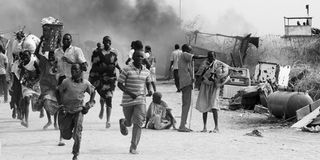Effects of war in sudan captured vividly in novel

What you need to know:
- Book Review: In the ongoing preparations of Makerere at 100, Levis Mugumya is making a case for the humanities at Makerere University in an era where Sciences have seemed to become the talking point, by Carolyne Atangaza.
Samuel Totten’s debut novel All Eyes on the Sky which is about life and death in the troubled Nuba Mountains of Sudan is a true reflection of what has bedeviled the North African country and its ending wars, the untold suffering, displacement and refugees.
Published by The African Studies Bookstore in 2020, the tragic story revolves around the life of one man, Jamil Chidubem, a Nuban, who, following his conscience, puts his life on the line for his people.

Jamil was adopted as a baby by a Dutch nun and later by a Nuba family when his parents disappeared without a trace. With thirteen years of education, Jamil was, for a Nuban, extremely well-educated. He was the sole teacher in a small elementary school in Kwalib. He is married to Gizma, who is pregnant for the third time.
As a result of the war that began in June 2011 between the Government of Sudan (GoS) and Sudan People’s Liberation Movement-North (SPLM-N) schools have been closed leaving the children without education and Jamil without a means of employment.
The daily lives and work is being disrupted by the routine aerial bombings which explode into frantic activity amongst cries of fear and warning. As soon as they hear the sounds of the planes the people race towards and jump into the closet manmade holes. The holes serve as “bomb shelters.” The people only venture back into the open when the explosions cease.
Jamil had lost count of how many times he and his family members had hurtled across their farm seeking protection from the bombs during this latest war. During the last war, a tiny piece of rock pierced Jamil’s left cornea, while a larger piece shattered his eye socket. A large chunk of shrapnel sliced deeply into the brain of Jok, Jamil’s oldest brother, killing him instantly.
Most of the civilians are on guard and find themselves glancing constantly upwards at the sky, hence the title of the novel.
Jamil, a strong Christian is torn between picking up arms to defend what their ancestors had bequeathed them and kill his enemies or to join forces with Nuba Mountains Dispatches (NMD), the small coterie of citizen journalists who boldly roamed throughout the Nuba Mountains covering the bombings and ground attacks in order to write up and submit to the international media. Many believed that once the world knew exactly what as taking place in the Nuba Mountains, help would be on the way.
Jamil convinces Gizma and her mother Mamata to relocate to the Yida Refugee Camp in South Sudan. Gizma had lost two babies while giving birth at home. He considered the advantages of having the baby in the hospital in the refugee camp at Yida versus at home again.
When they arrived in Yida, they are allocated a patch of land on which Jamil built their tukul (a traditional conical grass thatched house made of mud or millet stalks and wooden poles). He opens a tea house for Gizma and Mamata to earn an income in the camp.
Jamil leaves his wife and mother-in-law in the camp and goes to Kauda. He is recruited by NMD as a journalist. He had come to realize and appreciate that while working with NMD would be far from safe, it at least meant that he could help his people without killing others.
At NMD he covered the stories of Nuba citizens caught up in the war which were many and sorrowful. Witnessing horror up close, hearing the piercing wails of those who had been injured and those whose loved ones had been mortally wounded, listening to the sorrowful words of the survivors, and photographing evidence of the tragedies took a silent but increasingly evident toll on Jamil.
Jamil even contemplated going on a hunger strike to galvanize the international community to rescue his people. He also thought of emulating the Tunisian fruit vendor, Mohamed Bouazizi, who immolated himself in Tunisia in protest of police harassment and corruption.
Jamil is granted leave to return to his wife who had reached full term pregnancy. Gizma has a stillbirth, and she is devastated.
Three months to the day of his James’ death, Jamil decided to end his life by dying on a wooden cross after sensing that there was not a commandment against suicide in the Bible. He paid $200 to two young men to execute the task. His arms and legs were nailed on the cross, which is later placed in a hole by pulling ropes that re tied to rocks. The hired men pour petrol around the cross and set it on fire. Screaming in agony and crying out “Oh God,” Jamil’s voce was quickly smoothened as flames engulfed his head.
In the days that followed many men had themselves nailed to crosses and immolated giving their lives up for the Nuba cause. Women also began volunteering to be immolated for the entire world to see.
“All Eyes on the Sky” is available in Kampala at The African Studies Bookstore at the Uganda Museum, Aristoc Booklex and Uganda Bookshop.
Totten is a novelist and short story writer and is currently based in the United States. “All Eyes on the Sky” is his first published novel. He is currently completing another novel, The Trials of U.S. ‘Presidend’ Dunny Sump, and two books of short stories, one of which (African Tragedies. Short Stories of Crime Against Humanity and Genocide) will be published by The African Studies Bookstore.




